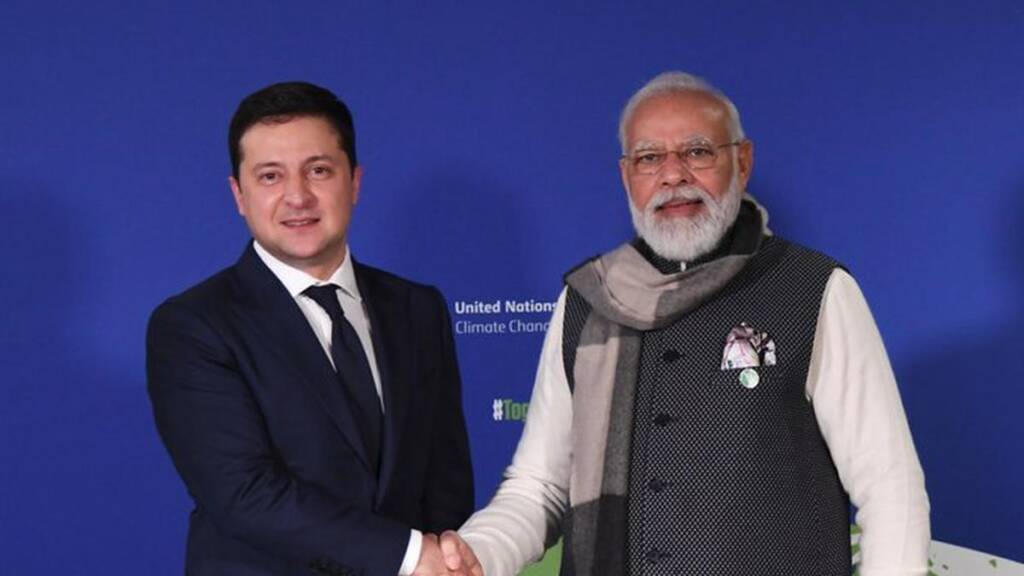Is India at the verge of solving the Russia-Ukraine deadlock? If we understand the optics well, first steps have already been taken.
Indian Prime Minister Narendra Modi was the first world leader to congratulate President Vladimir Putin on his re-election, underscoring a commitment to deepen India-Russia ties. In their dialogue, Modi emphasized the importance of dialogue and peace for resolving the Russia-Ukraine conflict, as detailed in a statement by India’s Foreign Ministry. Subsequently, on March 20, Modi engaged in a telephonic conversation with Ukrainian President Volodymyr Zelenskyy. Through social media platform X, Modi conveyed India’s unwavering support for peace initiatives and the provision of humanitarian aid aimed at mitigating the ongoing conflict.
Join us on Telegram: https://t.me/tfiglobal
During his discussions on the Russia-Ukraine situation, Modi has consistently advocated for a resolution through dialogue and diplomacy, asserting India’s dedication to a peaceful settlement of disputes. This stance was further illustrated by the Indian External Affairs Ministry’s engagement with its Ukrainian counterpart, culminating in the arrival of Ukraine’s Foreign Minister to New Delhi on March 28. This visit aims to enhance bilateral relations and cooperation, reflecting India’s nuanced foreign policy that maintains its historical alliance with Russia while supporting peace and dialogue in current global conflicts.
Dmytro Kuleba, Ukraine’s Foreign Minister, is set to meet with his Indian counterpart, Subrahmanyam Jaishankar, and the deputy national security advisor on March 29, as confirmed by India’s Foreign Ministry. Ukraine views India, under Prime Minister Modi’s leadership, as a pivotal mediator capable of bridging the West and Russia regarding the Ukraine conflict. In a recent conversation, Ukrainian President Zelenskyy encouraged India’s participation in a Peace Summit proposed by Switzerland, highlighting the importance of dialogue. Zelenskyy also expressed Ukraine’s interest in bolstering trade and economic relations with India, focusing on sectors such as agriculture, aviation, pharmaceuticals, and industrial goods, reflecting a strategic approach to deepen bilateral ties amidst global challenges.
Read More: $300 MILLION package intended for Ukraine VANISHES
In response to recent global events, India has maintained a nuanced stance, opting not to vote against Moscow at the United Nations and increasing its acquisition of Russian oil at reduced rates post-Russian special operations. Concurrently, India has enhanced its diplomatic and strategic engagements with Western entities, including the United States and the European Union. This multifaceted approach is underscored by India’s significant roles in both the BRICS alliance, alongside Russia, China, and Brazil, and the Quadrilateral Security Dialogue (Quad), with the U.S., Australia, and Japan, demonstrating its unique positioning on the global stage.
At a critical juncture in global diplomacy, India emerges as a unique mediator in the Russia-Ukraine conflict, holding the distinctive position of being acceptable to Russia while also being a negotiation partner the United States is willing to engage with. As a pivotal trade and defense ally of Russia, and a preferred partner of the U.S., India’s influence and soft power are at an unprecedented peak. Prime Minister Narendra Modi’s exceptional popularity and leadership, marked by securing approximately 70% of the vote in a nation of 1.4 billion people twice, underline his significant global stature and the country’s diplomatic leverage.
India’s strategy aims to moderate Ukraine’s stance, potentially steering it away from the West’s more combative demands towards a compromise reflective of a substantial portion of Russia’s expectations. Should India succeed in navigating these complex negotiations to a favorable outcome, it would not only signify a monumental diplomatic triumph in the 21st century but also cement India’s role as a preeminent force for peace and stability on the world stage.
